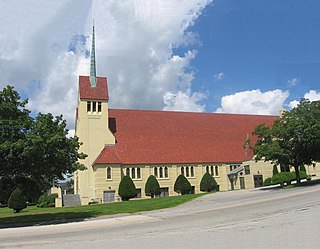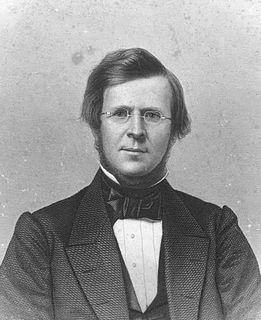Related Research Articles

Androscoggin County is a county in the U.S. state of Maine. As of the 2010 census, the county's population was 107,702. Its county seat is Auburn.

Lewiston is the second largest city in Maine and the most central city in Androscoggin County. The city lies halfway between Augusta, the state's capital, and Portland, the state's most populous city. It is one-half of the Lewiston-Auburn Metropolitan Statistical Area, commonly referred to as "L/A." or "L-A." Lewiston exerts a significant impact upon the diversity, religious variety, commerce, education, and economic power of Maine. It is known for an overall low cost of living, substantial access to medical care, and a relatively low violent-crime rate. In recent years, the City of Lewiston has also seen a spike in economic and social growth. While the dominant language spoken in the city is English, it is home to the largest French-speaking population in the United States while it is second to St. Martin Parish, Louisiana, in percentage of speakers.

Edmund Sixtus Muskie was an American statesman and political leader who served as the 58th United States Secretary of State under President Jimmy Carter, a United States Senator from Maine from 1959 to 1980, the 64th Governor of Maine from 1955 to 1959, and a member of the Maine House of Representatives from 1946 to 1951. He was the Democratic Party's candidate for Vice President of the United States in the 1968 presidential election, alongside Hubert Humphrey.

Bates College is a private liberal arts college in Lewiston, Maine. It is equidistant from the state capital, Augusta, to the north, and the cultural hub Portland to the south. Anchored by the Historic Quad, the campus of Bates totals 813 acres (329 ha) with a small urban campus which includes 33 Victorian Houses as some of the dormitories. It maintains 600 acres (240 ha) of nature preserve known as the "Bates-Morse Mountain" near Campbell Island and a coastal center on Atkins Bay. With an annual enrollment of approximately 1,800 students, it is the smallest college in its athletic conference. As a result of its small student body, Bates retains selective admission rates and little to no transfer percentages. The nominal cost of attendance is considered very high with tuition frequently among the most expensive in the United States.
The Colby-Bates-Bowdoin Consortium (CBB) is an athletic conference and academic consortium between three private liberal arts colleges in the U.S. State of Maine. The group consists of Colby College in Waterville, Bates College in Lewiston, and Bowdoin College in Brunswick. In allusion to the Big Three of the Ivy League, Colby, Bates, and Bowdoin, are collectively known the "Maine Big Three", a play on words with the words "Maine" and "main". The school names are ordered by their geographical organization in Maine.

The University of Southern Maine (USM) is a public university with campuses in Portland, Gorham and Lewiston in the U.S. state of Maine. It is the southernmost of the University of Maine System. It was founded as two separate state universities, Gorham Normal School and University of Maine at Portland. The two universities were combined in 1970 to help streamline the public university system in Maine and eventually expanded by adding the Lewiston campus in 1988.

William Pierce Frye was an American politician from Maine. Frye, a member of the Republican Party, spent most of his political career as a legislator, serving in the Maine House of Representatives and then U.S. House of Representatives, before being elected to the U.S. Senate, where he served for 30 years; dying in office. Frye was a member of the Frye political family, and was the grandfather of Wallace H. White, Jr. and the son of John March Frye. He was also a prominent member of the Peucinian Society tradition.

Oren Burbank Cheney was an American politician, minister, and statesman who was a key figure in the abolitionist movement in the United States during the later 19th century. Along with textile tycoon Benjamin Bates, he founded the first coeducational university in New England which is widely considered his magnum opus. Cheney is one of the most extensively covered subjects of Neoabolitionism, for his public denouncement of slavery, involuntary servitude, and advocation for fair and equal representation, egalitarianism, and personal sovereignty.

Cobb Divinity School, founded in 1840, was a Free Will Baptist graduate school affiliated with several Free Baptist institutions throughout its history. Cobb was part of Bates College in Lewiston, Maine, United States from 1870 until 1908 when it merged with the college's Religion Department.
Thomas Hedley Reynolds was an American historian and university professor who served as the fifth President of Bates College from March 1967 to November 1989.

Alonzo Garcelon was the 36th Governor of Maine, and a surgeon general of Maine during the American Civil War.
David Kolb is an American philosopher and the Charles A. Dana Professor Emeritus of Philosophy at Bates College in Maine.
James A. Joseph is an American former diplomat.

Ava Clayton Spencer is an American attorney and academic administrator serving as the eighth president of Bates College. She previously served as the vice president for institutional policy at Harvard University from 2005 to 2012.

The Bates family is an American political and banking family from Maine and Massachusetts whose members include a prominent member of the prestigious Hell Fire Club, the 26th U.S. Attorney General serving under Abraham Lincoln, the second Governor of Missouri, a member of the U.S. House of Representatives for Arkansas, and a prominent textile tycoon who founded the Bates Manufacturing Company and Bates College in Lewiston, Maine. The family includes various merchants, politicians, inventors, clergymen, artists, and socialites.
Stephen Marcus Engel is an American academic and political scientist who is currently a professor of politics at Bates College in Lewiston, Maine. He is an affiliated scholar with the American Bar Association.
References
- ↑ "Bangor Daily News quotes Professor Emeritus Hodgkin on Republican candidate". 2010-06-04. Retrieved 2018-03-12.
- 1 2 "Winter 2000: Our Man in Lewiston". abacus.bates.edu. April 27, 2000. Retrieved December 17, 2018.
- 1 2 "Doug Hodgkin / Sunday Author Series". Lewiston Public Library, Maine. November 1, 2015. Retrieved December 17, 2018.
- ↑ "Author Visit: Douglas Hodgkin 4/13". Auburn Public Library. 2017-03-26. Retrieved 2018-03-12.
- ↑ "Faculty". Bates College. Retrieved December 17, 2018.
- ↑ Meyer, J (October 5, 2015). "Hodgkin to appear at Andro Historical Society". Lewiston Sun Journal. Retrieved December 17, 2018.